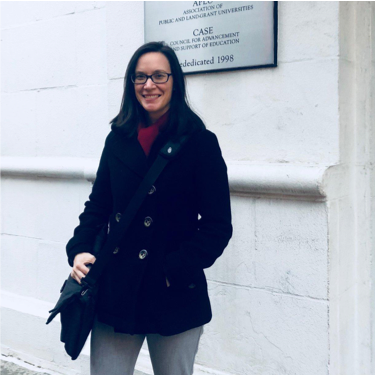Megan Tesene

Megan Tesene
Education
B.A. in Sociology – University of Northern Iowa (2005)
M.A. in Sociology – University of Northern Iowa (2011)
What do you do in your current position?
I direct grant-related work at a research and policy organization based in Washington, DC. I primarily consult with university faculty, staff and academic administrators on how to improve the quality and scope of teaching and learning on their campuses. Much of my work focuses on improving accessibility, closing achievement gaps and ensuring that students from all walks of life have the support and resources necessary to reach graduation.
I enjoy collaborating with students, faculty and academic leadership from colleges and universities throughout the United States. I especially like to visit the diverse types of college campuses and communities that make up the public university system.
How did your major help prepare you?
Sociologists study how people, processes and systems interact with, replicate and challenge one another. My training in sociology has provided me with an ability to identify, analyze and make sense of vast, complex structural systems as well as the minutiae of interactions between individuals in society. Such a perspective is paramount to researching how universities operate and providing suggestions for policies and practices that can drive institutional-level changes.
Most memorable part of your studies?
The faculty in the Department of Sociology, Anthropology, and Criminology are spectacular educators. They are committed to their students’ success, offering both the support and challenges that help students grow intellectually, personally and professionally. They’re also great mentors and advocates for their students. I was fortunate to have several faculty mentors while in my bachelor’s and master’s programs at UNI. Of special note, Professors Marybeth Stalp and Carissa Froyum guided me on my path to becoming a social scientist.
What advice would you give future panthers?
Enjoy it. Don’t be afraid to push boundaries and ask complex questions. Learn about and interact with people and perspectives that are different from your own. Interact and fully engage with your professors. They are here to help support you and they’ve got great advice. When all is said and done, know that you’ll leave the university with a degree and skill set that will enable you to take on whatever career you’ve set your sights on.
